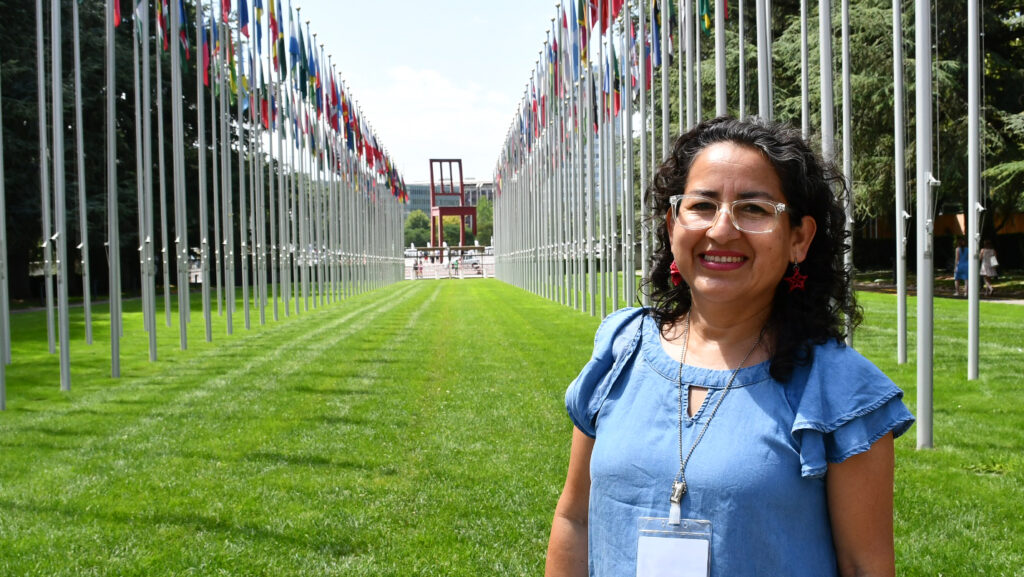More than twenty years after the end of the internal armed conflict, Guatemala is still suffering from these decades of extreme violence and discrimination against Indigenous communities. Rampant impunity and widespread high-level corruption persist. The judicial power plays a big role in muzzling dissent by blocking investigations of corruption and human rights violations, and arbitrarily prosecuting independent journalists and judges. The country has also become one of the most dangerous places for human rights defenders, who are routinely surveilled, criminalized, harassed, and in some cases, simply killed. In August 2023, anticorruption candidate Bernardo Arevalo unexpectedly won the presidential elections, giving new hope to the population. But since then, the Attorney General’s Office has sought to delegitimize the results, which in turn sparked protests across Guatemala.
In this context, we met with Brenda Peralta, who works as the coordinator of the Justice, Peace and Integrity Commission (JPIC) of the Franciscan Family of Guatemala, a member of the advocacy committee of the Franciscan Network for Migrants (FNM), as well as coordinator of the Causas Raíz Initiative in Guatemala. We discussed the situation in her country as well as how she sees her work towards more justice.
What are the main human rights issues in Guatemala?
For the past years, the “pact of the corrupt” – a group of powerful elites linked to organized crime – has undermined the rule of law, with systematic attacks against independent justice officials and the criminalization of activists, Indigenous leaders, and journalists. After exposing corruption at the highest levels of the government, the United Nations-backed International Commission against Impunity in Guatemala (CICIG) was pushed out of the country. Indigenous communities are also often being evicted from their territories, which causes internal displacement and other human rights abuses. The issue with these lands is that they were stolen during the internal armed conflict when the population went into exile, and powerful families and military fraudulently transferred the titles to their name. After the peace agreements in 1996, people returned to their territories, but now, these are being reclaimed by the supposed owners with the help of the government and paramilitary groups that want to use them for palm oil production, extractive mining, and hydroelectric projects.
What inspired you to work on these issues and how does it connect with your vocation as a Franciscan?
I met the Franciscans in my adolescence. They helped me become more aware of what was happening in my country at the time, which was during the last years of the internal armed conflict. However, it was not until many years later that I came to know the JPIC. Their work for the care of our common home and towards the construction of a better world for all became a way of life for me. We seek to create awareness in both religious and secular Franciscan communities about social and political problems and how they affect us. We are also trying to show the importance of solidarity and how political and citizen participation contributes to creating solutions.
What are the main challenges of your work?
I think one of the main challenges is the coordination of our common goal, which is to change unjust structures. A lot has been done already at the regional level, with Central America and Mexico, but we still have a long way to go. We work on many fronts simultaneously to be able to see changes. This can be challenging, but I do it with pleasure because it is out of conviction. Another challenge is to encourage advocacy from the Franciscan family. Indeed, some might be wary of getting involved on certain issues, because there is always a safety risk when working as a human rights advocate.
What achievement are you most proud of?
The positive response and trust that many Franciscans have been given during these years is truly heartwarming. We have established alliances with leaders, other religious organizations, and civil society. Good teamwork was essential to improve the way we do things, and to be involved at different levels, including internationally. For instance, working with the United Nations helps to make visible situations of human rights violations that would be harder to denounce locally due to security issues. It also generates trust in the local people and networks we already work with and facilitates connection spaces to create new networks.
How do you see the difference between charity and human rights work do you think they complement each other?
One of the JPIC’s principles is charity, which we understand at three levels. First, the welfare, such as feeding the hungry, then the promotional, which is raising awareness, and finally, structural. While some people mainly dedicate themselves to the first part – which is great – I think it is essential to go further than that and work on the root causes of injustice. In that sense, charity and human rights work complement each other very well.
For more information, check out our main article on Franciscans at the Forefront of Human Rights.

